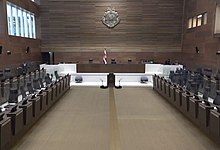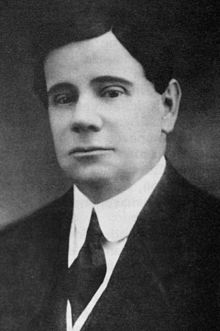History of the Costa Rican legislature
[1] In 1812 this Constitution is enacted by the Cortes Generales and it establishes that it is up to them to propose and decree laws in conjunction with the Monarch, as well as to interpret and repeal them if necessary.
In both statutes it was stipulated that the government of the province would exercise it to a three-person board called the Diputación de Costa Rica that would last while the Federation was consolidated.
In this constitution it contemplated the separation of powers and delegating the approval of the laws in the Legislative Branch, which would reside in a single chamber, called the Federal Congress, composed of representatives at the rate of one for every 30,000 inhabitants, renewable by halves each year.
The Federal Senate was also regulated, composed of two members elected popularly by each of the States and renewable by thirds each year, to whom it was appropriate to give or deny the sanction to the laws.
It maintains the bicameral system, in which the Congress approves the laws and a Senate only sanctions them, without legislative initiative capacity.
This system remains unchanged in the Political Constitution of 1848, which governs from November 30, 1848, to August 14, 1859, but is called "Chamber of Representatives."
This constitution, which lasted for two years, was drafted by the presidents Bernardo Soto Alfaro, Rafael Iglesias Castro, Ascensión Esquivel Ibarra, Cleto González Víquez and Carlos Durán Cartín.
[2] José Joaquín Rodríguez Zeledón excused himself using health reasons and Ricardo Jiménez Oreamuno alleged that he was on his farm.
[3] With the Costa Rican Civil War in 1948 that overthrew the government of Teodoro Picado Michalski, the constitutional order was broken yet again and the Founding Junta of the Second Republic, headed by José Figueres Ferrer, took over.
Subsequently, by means of Law N ° 2741 of May 12, 1961, the constitutional text was amended to leave the number of deputies fixed at 57 and eliminates the alternates.
[4] According to Eduardo Oconitrillo García, once the Constitutional Assembly of 1917 was over, and since the senatorial and diputadile elections that were planned for 1919 had not yet taken place, the constituent deputies were divided in such a way that the 14 oldest ones provisionally established the Senate and the 29 youngest the Lower House.
[6] The existence of the same lasted only two years since that constituent body was abolished after the overthrow of Federico Tinoco in 1919 and the Constitution was re-established back to 1871 that established a unicameral Congress.
[6] The Legislative Assembly of Costa Rica is a unicameral body of 57 deputies whose number is constitutionally fixed and who are elected in closed lists postulated by the political parties by reason of a proportional system.
Different experts have recommended the increase in the number of deputies as an urgent need to improve representativeness, but this proposal is highly unpopular among the population and generates reactions of rejection.
[7] A report of the United Nations Development Program and the Center of Investigation and Political Studies of the University of Costa Rica recommended to increase the number of legislators to 82.
[10] The proposal of the book Aplicación del modelo alemán a la elección de diputados en Costa Rica by lawyer Diego González suggests increasing the number to 143, making use, as the title indicates, of an electoral system similar to the German model.
[7] The proposal of Citizen Power Now is similar, proposes a mixed proportional representation where 42 deputies would be elected, one from each of 42 electoral districts created for that purpose, and the other 42 would be chosen proportionally according to the party's vote and could be reelected consecutively, a maximum of three periods (currently the Costa Rican deputies can not be re-elected consecutively, but they have no limits to be re-elected alternately).
One of the first to propose it over the year 2001 was the then President Miguel Ángel Rodríguez Echeverría, as a way to solve the problem of political governability in the country.
[11] This was suggested again by the Commission of Notables for the Reform of the State convened by Laura Chinchilla, and to which belonged the minister of the presidency Rodolfo Piza.
[12] A bill present in the legislative current and studied in committee would seek to increase the number of deputies and make the parliament name and remove ministers, able to call early elections if the president receives a vote of no confidence and that the president can dissolve Parliament and hold elections.
[14] The ex-deputy, former minister and former presidential candidate Rolando Araya Monge, who is part of the Second Commission of Notables for State Reform, this time convened by President Carlos Alvarado Quesada, announced that he would propose both the passage to parliamentarism and going back to bicamerality.



